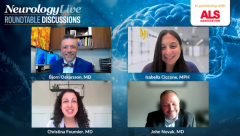
Reviving ALS Awareness Campaigns to Reaffirm Support for the Patient Community
Experts discussed the ongoing importance of awareness, funding, and early diagnosis in amyotrophic lateral sclerosis, welcoming the return of the well-known Ice Bucket Challenge. [WATCH TIME: 5 minutes]
WATCH TIME: 2 minutes
Episodes in this series

Recent advancements in amyotrophic lateral sclerosis (ALS) research may reshape how clinicians understand and help patients manage the disease, with potential therapies slowly emerging that aim to target both genetic and cellular pathways. Alongside these strides, there seems to be a growing emphasis on a holistic care approach following diagnosis to offer additional support for patients throughout the disease course. Furthermore, genetic testing could become more valuable in guiding diagnosis and offering refined treatment decisions for patients. Together, these developments in the field might highlight a shift toward more comprehensive, individualized care strategies that can address both the biological and lived experience of patients with ALS.
In collaboration with
In this fourth episode, panelists reflected on the enduring impact of the Ice Bucket Challenge and voiced support for its revival to reignite public attention and funding for ALS. During the conversation, experts highlighted the need for continued awareness at the legislative and medical community levels, with particular emphasis on reducing diagnostic delays and improving access to multidisciplinary care. Additionally, the speakers underscored the urgency faced by newly diagnosed individuals with ALS and the importance of renewed momentum in research and resource allocation.
Transcript edited for clarity.
Isabella Ciccone, MPH: I just wanted to add, since you brought up the ALS challenge. I mean, that was such a big viral thing, and it seems to be coming back. I didn't know if you had any comment about that, and just the importance of continuing to bring this to the minds of the ALS community, the patients, the clinicians, and the general public, especially since this [May] is ALS Awareness Month.
Christina: Bring back the attention, bring back the money. I mean, if you think about it, when the Ice Bucket Challenge started, many people with ALS who were present for that first challenge are no longer with us. There's a whole new group of people with ALS who are fighting this. It didn’t affect them personally back then, so that urgency is real. And so anything like the Ice Bucket Challenge that brings attention, money, and resources to ALS is so desperately needed, and we're all for it. We'll douse ourselves with ice buckets as long as it goes to the cause any day because it's so important.
Bjorn: ALS awareness is critically important today. We need it at all levels of legislation and to continue funding for ALS research and ALS care.
John: We need awareness in the medical community in general. Our time to diagnosis is way too long. You're a year plus—a year to a year and a half for a lot of people before they get diagnosed with ALS. That means they're not treated, they're not in trials, they're not being cared for in a multidisciplinary clinic like they should be. And so things like that, to bring awareness even to the medical community to think about, Oh, I wonder if this could be ALS, and then send them to someone who can sort it out is going to be huge. And if it's ice buckets that do it, we’ll gladly dump ice buckets or whatever else they can come up with. We're all for it, because it made a huge difference. The money, the awareness of it, the growth in ALS research, pharmaceutical industry interest, it’s huge. Our conferences are busier. I think it all started with that. It's an amazing thing. We’d gladly do it again.
Newsletter
Keep your finger on the pulse of neurology—subscribe to NeurologyLive for expert interviews, new data, and breakthrough treatment updates.











